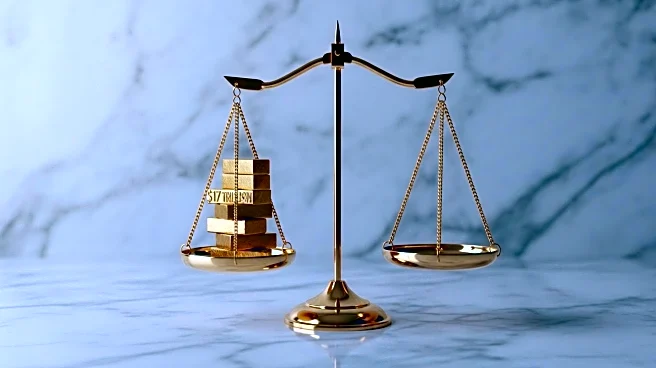What's Happening?
President Trump has claimed that his administration has secured $17 trillion in new investments through tariffs, tax cuts, and negotiations with global leaders. This figure is intended to support new factories, technologies, jobs, and economic growth. However, the accuracy of this claim is questioned, as the White House's own data lists investments at $8.8 trillion, some of which were initiated during President Biden's tenure. The administration's strategy involves using tariffs to encourage foreign investment in the U.S., but the effectiveness and transparency of these commitments are under scrutiny. Critics argue that the actual investment commitments are significantly lower and that the approach may strain international relations.
Why It's Important?
The implications of President Trump's investment claims are significant for the U.S. economy and its global relationships. If the investments materialize, they could boost job creation and economic growth. However, the skepticism surrounding the figures and the reliance on tariffs could lead to strained diplomatic ties and potential economic repercussions. The strategy of using tariffs as leverage may deter future investments if perceived as coercive. Additionally, the discrepancy in reported figures raises concerns about transparency and accountability in economic policy. The outcome of these investment commitments could influence public perception of Trump's economic leadership and impact his political standing.
What's Next?
The next steps involve clarifying the terms and validity of the investment commitments. The administration may need to provide more detailed information to substantiate the $17 trillion claim. Stakeholders, including foreign governments and companies, will likely seek assurances and clearer terms to proceed with their investments. The political and economic landscape will be closely monitored to assess the real impact of these commitments on the U.S. economy. Potential reactions from international partners could shape future trade and investment policies, influencing the broader economic strategy of the Trump administration.
Beyond the Headlines
The broader implications of President Trump's investment strategy include potential shifts in international economic alliances and trade dynamics. The use of tariffs as a tool for economic leverage may set a precedent for future administrations, affecting long-term U.S. trade policy. The approach could also influence global perceptions of the U.S. as a trade partner, impacting its ability to negotiate favorable terms in future agreements. The focus on securing large-scale investments may overshadow other critical economic issues, such as sustainable growth and equitable distribution of economic benefits.









